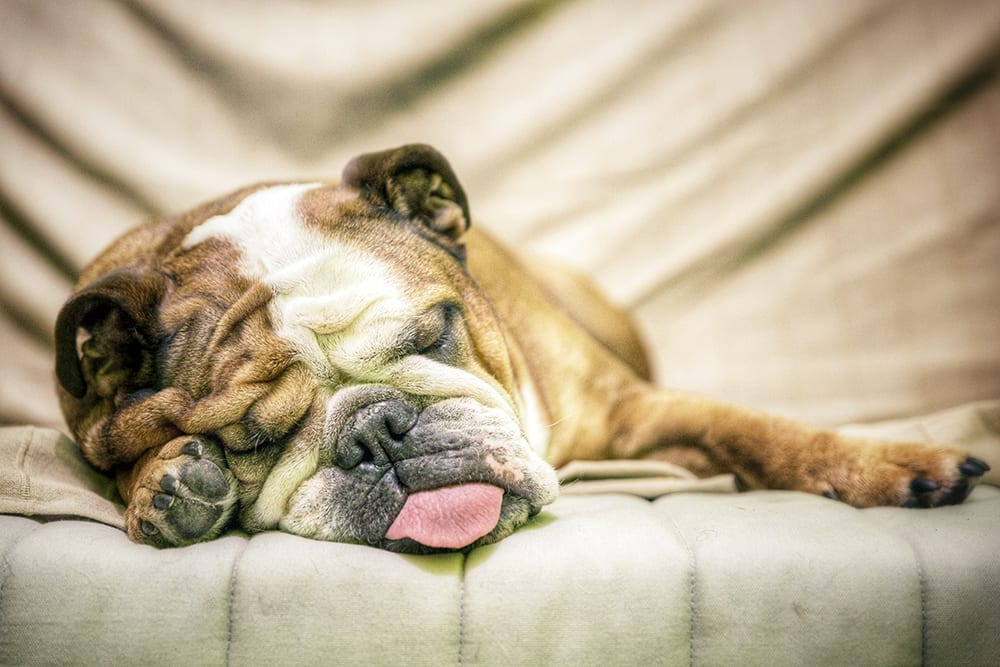Panting & Your Dog's Health
Similar to how humans sweat, panting is a completely normal bodily process for dogs and it is an effective way to regulate their body temperature. However, panting at night is a different matter — especially when there's no clear reason for the dog's distress.
Health Concerns That Can Lead to Excessive Panting in Dogs
Sometimes, your dog panting may be no cause for alarm, such as after a long walk on a summer's day, excitement at seeing their favorite human or an energetic play session. Panting and restless behavior (e.g. pacing) in mild or ideal weather conditions, or at night when it's cooler, may point to something more serious. Some potential reasons for excessive panting in dogs can include:
- Heart Disease - Heart disease (or heart failure) is marked by symptoms such as coughing and excessive panting. This condition can severely impact your dog's ability to breathe. You may notice your dog panting heavily after walking only short distances.
- Cushing's Disease - When too much cortisol accumulates in the bloodstream, Cushing's disease can occur. Other symptoms in addition to panting may include frequent urination, hair loss, a pot-bellied appearance, and increased thirst and hunger. This health condition is commonly diagnosed in senior dogs and is one potential reason for abnormal panting.
- Respiratory Disease - Respiratory issues can impact your dog's ability to breathe, making it difficult for oxygen to get to their bloodstream so it can be carried to the rest of the body. A dog suffering from respiratory issues may pant heavily or struggle to breathe after even light exercise. If you notice your dog's tongue has turned purple, grey or blue instead of a healthy pink, go to a vet immediately for treatment; your dog may be experiencing oxygen deprivation.
- Heatstroke. Heatstroke in dogs is a serious issue and can have fatal consequences if left untreated. Heatstroke in dogs is more likely in temperatures over 106°F (41°C) and causes heavy panting, which leads to dehydration. High temperatures are especially hard on short-nosed breeds like pugs, but you must never leave a dog of any breed alone in a car in warm weather, as they can overheat or suffer from heatstroke quickly.
When Dogs Are Panting & Restless at Night
Below are some answers to a question many dog parents have come to us with: 'Why is my dog restless and panting at night?':
- Stress or anxiety. This can be caused by upsetting events like loud thunderstorms or fireworks, or issues like separation anxiety.
- Environmental issues. Puppies and senior dogs have a harder time coping with high nighttime temperatures, and dogs with untreated allergies often have disrupted sleep.
- Pain or Discomfort. Dogs experiencing pain from an injury or a condition such as arthritis may exhibit nighttime panting and/or pacing behaviors. (e.g. injury, arthritis, allergies)
- Canine Cognitive Disorder (dog dementia). Dogs affected by this disorder often have disturbed sleep-wake cycles and may exhibit excessive panting and restlessness.
When should my dog see a vet?
If your dog exhibits symptoms of excessive nighttime panting, pacing, or other anxious behaviors get in touch with your vet to find out whether your dog should come in for a wellness exam.
If you spot any signs of heatstroke in your dog, immediately take them for urgent veterinary care during clinic hours, or treatment after hours at a nearby emergency veterinary hospital.
Your veterinarian will examine your canine companion, perform any necessary diagnostic and treatment procedures, and work with you to help your dog feel better today and tomorrow.
Note: The advice provided in this post is intended for informational purposes and does not constitute medical advice regarding pets. For an accurate diagnosis of your pet's condition, please make an appointment with your vet.
Is your dog panting or restless at night? Our Memphis vets are here to help. Contact Southwind Animal Hospital to book an examination for your four-legged friend.
Looking for a vet in Southeast Memphis?
We're always accepting new patients, so contact our veterinary hospital today to book your pet's first appointment.
Related Articles View All
How can a dog get rabies? What are the signs?
Rabies is a fatal, highly contagious, virus that can affect dogs, cats, livestock and humans! What are the signs your dog has rabies? What should you do? Read on to find out.
Signs that Your Dog May Have an Ear Infection
Dog ear infections need treatment quickly to prevent the condition from becoming more severe, or causing recurring infections in the future. So, how can you tell if your dog has an ear infection? Read on to find out.
How often should I take my dog to the vet?
Taking your dog to the vet regularly is a proactive way to help your pet live a long and healthy life, but how often should you take your dog to the vet? And, how can you save money on these routine appointments? Read on to find out.
Puppy Shots Schedule - When To Get Your Puppy Vaccinated
Vaccinations play an essential role in protecting your puppy's health in their first year of life. Here, you will find vital information about puppy vaccines and a schedule to help you plan for your puppy's shots.
Should I microchip my dog?
If your dog is lost or stolen, a microchip sitting under their skin can increase their chances of being returned to you. Not sure if you should get your four-legged friend microchipped? Below, we look at some of the reasons why many vets recommend microchipping for dogs.

